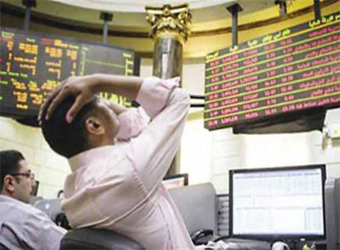In June that witnessed the Ethiopian dam crisis alongside mounting desperate fuel shortage and the investors’ apprehension over a planned anti-regime protests, Egypt’s stock market has reportedly encountered losses of EGP 39.7 billion.
The capital market dived by 11%, closing at EGP 321.678 billion by the end of June sessions, compared to EGP 361.435 billion by the end of last May sessions.
During June, the political and economic crisis were deepened by the continuous power outage and the fuel shortage which has resulted in driving the factories in Egypt to incur massive losses and halt their activities.
Also, the political deadlock has spurred the EGX to incur the massive losses in June.
The Egyptian Exchange’s indices reported lackluster performance during June.
Through June – the main index, EGX30 sank by 12.62% to end at the level of 4752 points. For the mid- and small-cap index, the EGX70 pushed down by 18.22% to close at 360 points; while, the price index EGX100 sagged by 13.30% to conclude at the level of 642 points.
In June, EGX’s traded volume reached around 1.634 million securities worth around EGP 10.8 billion, exchanged through 267 thousand transactions. Noting that, through last May the traded volume had reached 1.259 million securities worth around EGP 10 billion, exchanged through 265 thousand transactions.
Elsewhere, the traded volume for the EGX of SMEs – NILEX through June has amounted to 3.5 million securities worth EGP 8.5 million, exchanged through 1.166 transactions.
For EGX’s Over-The-Counter – OTC trading, the shares had seized 82.97% out of the total traded value; while traded value of the bonds represented 17.03% in June.
Investors Activities
Local investors led the market activity through June, seizing 68.01% of the total market; while non-Arab foreigners and Arabs seized 24.34% and 7.65%, respectively of the total market, after excluding the deals.
Excluding the deals, the non-Arab foreigners were net buyers in June, with a net equity of EGP 251.17 million; while Arabs were net buyers, with a net equity of EGP 170.45 million, after excluding the deals.
It is worth noting that the non-Arab foreigners were net sellers since the beginning of 2013, with a net equity of EGP 92.21 million; while Arabs were net sellers, with a net equity of EGP 292.33 million, after excluding the deals.
Also in June, institutions had seized 53.15% of the EGX’s transactions; while individuals had 46.85%.
Institutions were net buyers, with a net equity of EGP 41.98 million through April, after excluding the deals.
Stocks Losses – Main Drivers
On June 2nd, Egypt’s top court has ruled that the upper house, or Shura Council, and a panel that drafted the new constitution are invalid. The Supreme Constitutional Court ruled that the laws governing the election of members of the Islamist-dominated Shura Council and the constitutional panel were illegal.
On June 4th, a court in Cairo has convicted 43 Egyptian and foreign employees of non-governmental (NGO) organizations for working illegally in Egypt. The court sentenced the defendants – most of them in absentia – to jail terms of up to five years.
It also ordered the closure of offices and the seizure of assets in Egypt belonging to several US NGOs. The court’s ruling also include the closure of a number of NGOs operating in Egypt, including the US-based International Republican Institute (IRI) and the National Democratic Institute (NDI).
Following Ethiopia’s announcement of diverting a stretch of the Blue Nile to make way for its controversial $4.7bn (£3.1bn) hydroelectric dam, Cairo argued on June 8th that Addis Ababa has not properly considered the dam’s impact on the river, saying that a report put together by experts from Egypt, Sudan and Ethiopia is inadequate.
The Egyptian government suffered embarrassment on Monday when senior Egyptian politicians called in to discuss the crisis were apparently unaware their meeting was being broadcast live on television.
